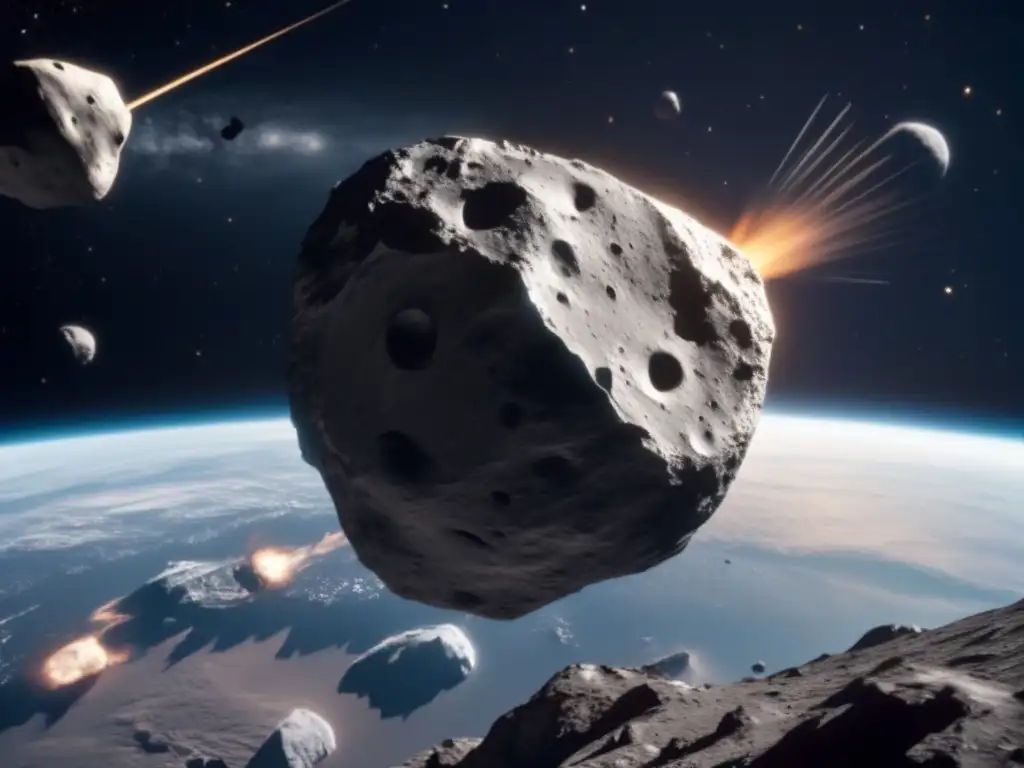Between A Rock And Our Place: Asteroid Defense Strategies

Introduction
When it comes to the safety and security of our planet, there are few topics as potentially catastrophic as asteroid impacts. The very real threat of a large-scale impact has led scientists and researchers to develop strategies for planetary defense. In this article, we will explore some of the most promising asteroid defense strategies and the technologies that make them possible.
Deflection Strategies

Kinetic Impactor
The kinetic impactor method involves sending a spacecraft equipped with a heavy metal object directly at an incoming asteroid. The idea is to collide with the asteroid at high speed and deflect it off course. This strategy’s success depends on early detection of the incoming asteroid and a precise impact angle.
Gravity Tractor
The gravity tractor approach uses a spacecraft to fly in close proximity to an asteroid and use its gravitational pull to slowly but surely alter the asteroid’s orbit. This solution is particularly useful for large asteroids that would be challenging to deflect with kinetic impactors.
Solar Sail
Solar sails work on the principle of using photons from the sun to generate a force that moves the sail and spacecraft forward. A solar sail equipped spacecraft could intercept an asteroid and use the photons from the sun to gradually push the asteroid out of its collision trajectory.
Disruption Strategies

Nuclear Explosives
Nuclear explosives would be one of the most powerful ways to disrupt an incoming asteroid, but this method has significant potential drawbacks. Risks range from potential fragmentation of the asteroid into smaller, equally dangerous pieces to nuclear fallout from failed missions. There are also international treaties that limit the use of nuclear power in space.
Directed Energy
Directed energy weapons such as lasers could also be used to disrupt incoming asteroids. The idea is to heat up an area on the asteroid's surface to vaporize material from the asteroid, expelling it in the opposite direction and generating a small but constant force that would alter the asteroid's trajectory. While this method has considerable potential, further research is needed to determine the required power and feasibility of deploying it.
Cluster Missions
A cluster mission approach relies on multiple missions to divert or disrupt an incoming asteroid. The idea is to use a combination of kinetic impactors, gravity tractors, and, if necessary, nuclear explosives, energy weapons, or other methods. This multifaceted solution is a promising way of ensuring the success of planetary defense strategy.
Frequently Asked Questions

-
How likely is an asteroid impact?
Asteroid impacts are highly unlikely, but they are a real threat. A large asteroid impact could potentially cause catastrophic damage or even lead to the extinction of humanity.
-
What makes asteroids particularly dangerous?
Asteroids can be difficult to detect, and their speed and size make them challenging to deflect or disrupt effectively. Additionally, some asteroids are composed of volatile materials that could cause secondary impacts or explosions.
-
What is the best asteroid defense strategy?
There is no one-size-fits-all answer to this question, as the ideal defense strategy depends on factors such as the size and composition of the asteroid, the amount of time available for detection and response, and the resources available for defense.
-
How can I get involved in asteroid defense efforts?
There are many organizations working on asteroid detection and defense strategies. Consider volunteering or supporting these groups, spreading awareness, and contacting your elected representatives to voice your concerns about planetary defense.
-
What would happen if an asteroid impact occurred?
The consequences of an asteroid impact would depend on the size and location of the asteroid as well as the level of preparedness of the impacted area. In the worst-case scenario, an asteroid impact could cause massive destruction, loss of life, and catastrophic environmental consequences.
Conclusion
While we hope that Earth never has to face the possibility of a catastrophic asteroid impact, it is essential to be prepared for the worst. The development of different defense strategies shows promising prospects for mitigating the threat of asteroid impacts. With continued research and innovation, we can hopefully make our planet a safer place to live.
Thank you for taking the time to read this article on asteroid defense strategies. If you have any thoughts or questions, please share them in the comments section or contact Asteroid Realm directly. Stay informed and stay safe!
Additional Resources

 The Art Of Asteroid Defense: Current Techniques And Tools
The Art Of Asteroid Defense: Current Techniques And Tools Our Planetary Shield: How We Keep Asteroids At Bay
Our Planetary Shield: How We Keep Asteroids At Bay Dodging Cosmic Bullets: Techniques For Asteroid Defense
Dodging Cosmic Bullets: Techniques For Asteroid DefenseIf you want to discover more articles similar to Between A Rock And Our Place: Asteroid Defense Strategies, you can visit the Planetary Defense category.
Leave a Reply

Articulos relacionados: